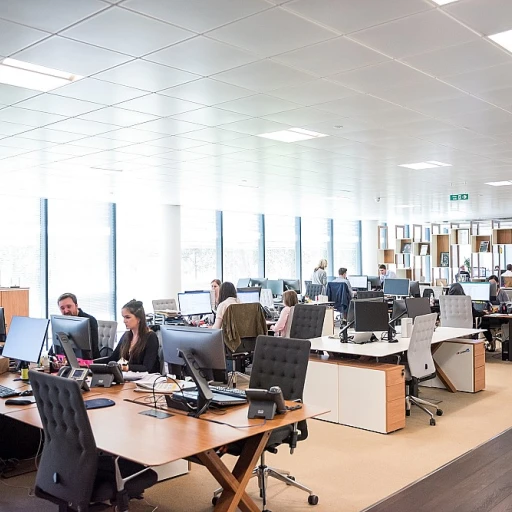
The Evolution of Employee Monitoring
The Rise of Employee Monitoring Technologies
Over the last decade, the way organizations monitor their employees has transformed significantly. The shift from traditional methods to advanced electronic systems is driven largely by the need to maintain productivity while adapting to remote work models. This surge in the necessity for monitoring can be attributed to the expansion of remote and hybrid work environments. Companies now aim to use these monitoring tools to ensure employees are productive even when they are not at their office desks.Adapting to a Digital Landscape
With the emergence of sophisticated employee monitoring software, businesses have access to comprehensive insights into employee work habits. These tools, like Kickidler and Time Doctor, offer features such as time tracking, keystroke logging, and real-time data analysis. Companies can thus manage their team’s work hours effectively by leveraging features such as time clocks and mobile apps.Why Employee Monitoring is Crucial
As the world shifts towards digital workplaces, employee productivity can be closely observed through monitoring tools that track time spent on various tasks. These systems not only help in maintaining employee engagement but also safeguard company resources by identifying potential areas of inefficiency. Techniques involving time tracking and user management contribute to boosting productivity as employees are more accountable for their work hours. For small businesses and large enterprises alike, adopting the right employee tracking systems helps in aligning organizational goals with employee performance. This alignment promotes a productive work environment, whether employees operate from the office or remotely. As these technologies continue to evolve, it’s crucial for companies to stay informed about the latest features and free trial options available. Not only does this enhance employee engagement and management, but it also ensures that the organization maximizes the value of their chosen system. To delve into the implications of remote work data breaches in cafes, organizations must understand the intersection of environment and technology in safeguarding data.Features of Modern Employee Tracking Systems
Key Attributes That Define Modern Monitoring Systems
When considering modern employee monitoring solutions, the features and capabilities have evolved significantly, catering to the needs of a diverse and sometimes remote workforce. These systems are designed to help businesses enhance productivity while maintaining a healthy work environment.- Real-Time Tracking: Modern monitoring software allows employers to track employee activity in real time. This feature is not just about knowing what tasks employees are working on, but also understanding their overall productivity trends, and identifying bottlenecks in processes.
- Comprehensive Data Collection: With enhanced capabilities, these systems can gather data from various sources, including the time spent on tasks, websites visited, and even keystroke logging. This approach provides a richer understanding of how employees utilize their time and navigate their tasks during work hours.
- Customizable Features: Companies today can tailor monitoring systems to fit their specific needs, choosing the relevant metrics that align with organizational goals. These might include features like app usage, employee time engagement, and tracking software utilization.
- Flexible Accessibility: Employing cloud-based monitoring and mobile apps ensures managers can oversee employee activities whether they are in the office, working remotely, or on the move. The adaptability of these systems is crucial for maintaining oversight in a digital and often decentralized workplace.
- Integration with Existing Systems: Many modern tools are built to integrate seamlessly with other productivity and time tracking apps, like Time Doctor or Kickidler, which can help streamline employee time management systems across the board.
- Free Trial Options: Numerous employee monitoring solutions offer a free trial period. This provides companies the opportunity to assess the software's effectiveness, ensuring it aligns with employee productivity and work management objectives before committing to a full deployment.
- Ethical and Transparent Use: Modern solutions also offer features that can boost transparency, such as user notifications when monitoring is active. This can help mitigate concerns surrounding privacy and ensure an ethical approach to employee tracking.
Legal and Ethical Considerations
Legal and Ethical Boundary of Monitoring Tools
In today's digital age, businesses find themselves navigating the complex realm of employee monitoring tools for computers running Windows 7, 8, and 10. While these tools can significantly enhance productivity and management, companies must tread carefully around the legal and ethical dimensions of monitoring employees' work.
Monitoring software can track time spent on various tasks, capture keystroke logging data, and provide user insights on real time activities. However, the use of such tracking software requires a fine balance between transparency and employee trust. Businesses should clarify how they intend to track time and ensure team members understand the purpose behind the employee time tracking.
So what legalities are at play? Companies need to adhere to varying regulations based on jurisdiction, such as data protection laws and privacy concerns. It’s crucial to consider how collected data might impact employee engagement and morale if mishandled.
Moreover, ethical considerations should not be overlooked. This means subtly aligning employee monitoring practices with company values and considering the impact on employee productivity and real-time management decisions. By selecting the right monitoring tool, businesses can respect their employees' privacy while still achieving intelligent network management.
In conclusion, ensuring an ethical approach involves clear communication with your team about monitoring practices, offering a free trial of the tracking software to familiarize employees, and implementing feedback mechanisms, enabling organizations to choose systems that benefit both the company and the employees ethically. The success of such implementations often lies in understanding and respecting the balance between management needs and employee privacy rights.
Impact on Employee Productivity and Morale
Effects on Motivation and Efficiency
Employee monitoring has sparked diverse opinions about its impact on productivity and morale. When implemented thoughtfully, monitoring tools can empower employees by providing structure and clarity around work hours and responsibilities. Modern monitoring software, such as Kickidler, includes user-friendly features like time tracking and management tools, allowing both remote and on-site employees to track time effectively. While the data gathered from tracking software can be invaluable for understanding time spent on tasks, it’s crucial to consider how these systems affect employee engagement. Real-time monitoring can help a team stay aligned with the company’s goals, but a balance needs to be struck. Too much oversight may lead to decreased morale if employees feel they are under constant surveillance or if keystroke logging comes off as invasive. To boost employee productivity, it's important for companies to focus on transparency and trust. Employees need to understand why the monitoring system is in place and how it benefits both the company and their own growth. This understanding helps cultivate an environment where employees feel valued and motivated rather than scrutinized. Employers might offer a free trial of monitoring tools to get feedback and adjust the system to match employee expectations. Moreover, remote or hybrid teams often find that time tracking apps assist in identifying peak productivity periods, allowing management to align work schedules with employee strengths. However, for small businesses and large corporations alike, it's essential to choose monitoring tools with features that support rather than hinder employee morale, thereby maximizing the benefits of these systems. If a company uses a robust monitoring tool that respects employees' privacy and offers them control over their data, the overall work environment can improve. This makes it possible to track time and productivity without interfering with the personal dynamics and sense of ownership employees have over their projects. Thus, the right employee time and tracking software becomes a keystone in optimizing both productivity and team morale.Choosing the Right System for Your Organization
Identifying the Ideal Monitoring Solution
Choosing the right monitoring software for your company can feel like navigating a maze filled with endless options and considerations. With various systems available for Windows 7, 8, and 10, including popular ones like Kickidler and Time Doctor, identifying what suits your organization involves understanding specific business needs and the array of features each tool offers.- Assess Business Needs: Begin with a thorough assessment of your business goals, employee time management strategies, and the specific features required. Consider whether a free trial or a limited-time free plan will benefit your decision-making process.
- Key Features and Compatibility: Look for robust tracking software that integrates seamlessly with your existing infrastructure. Critical features may include real-time monitoring, time clock functionalities, keystroke logging, user data analysis, and mobile app support.
- Focus on Employee Engagement: An effective system should balance between monitoring employee productivity and fostering a sense of transparency and trust within the team. Clear communication about the use and benefits of employee tracking can improve employee engagement and reduce potential morale issues.
- Scaling with Business Growth: A flexible system that grows with your company can save time, money, and effort. Evaluate systems on their scalability and extended features, especially if you foresee remote work becoming a long-term arrangement.
- Consider Legal and Ethical Implications: When implementing employee monitoring, understanding the legalities in your jurisdiction is essential. Ensure your chosen tool complies with relevant privacy laws and ethical guidelines to maintain trust and prevent legal issues.
- Vendor Support and Reputation: Reliable customer support is critical. Investigate the reputation and user reviews of any monitoring tool before committing to ensure the company will provide the needed support and software updates.
Future Trends in Employee Monitoring
Advancements Shaping the Future of Monitoring Tools
The landscape of employee monitoring is constantly evolving, with technology at the forefront of this transformation. As companies increasingly embrace remote work, the demand for sophisticated monitoring tools continues to rise. Here's a glimpse into what the future holds for employee monitoring systems.- Artificial Intelligence and Machine Learning: The integration of AI and machine learning is set to revolutionize monitoring software. These technologies can offer more accurate insights into employee productivity by analyzing trends in real time. They can help identify patterns that suggest work inefficiencies and automate mundane tasks, boosting overall productivity.
- Improved Data Analytics: Future systems will likely provide enhanced data analytics capabilities. This will allow companies to not only track time spent on various tasks but also derive actionable insights to improve employee engagement and management strategies.
- Remote Work Adjustments: As remote work becomes a permanent fixture for many, monitoring tools will need to adapt. Enhanced features for mobile apps, such as tracking work hours and monitoring user activities without being intrusive, will be essential. Companies will expect solutions like Kickidler and Time Doctor to offer flexible monitoring to suit both in-office and remote environments.
- Emphasis on Privacy and Ethics: As monitoring software becomes more advanced, maintaining ethical standards and protecting employee data will become increasingly important. Future systems will need to strike a balance between employee tracking and privacy, ensuring that monitoring is conducted in a way that's transparent and respectful of individual rights.
- Increased Customization and Integration: The ability to customize employee monitoring tools to fit the unique needs of different teams or departments will become more accessible. Furthermore, seamless integration with other management systems and apps will be crucial for small businesses and larger enterprises alike.













